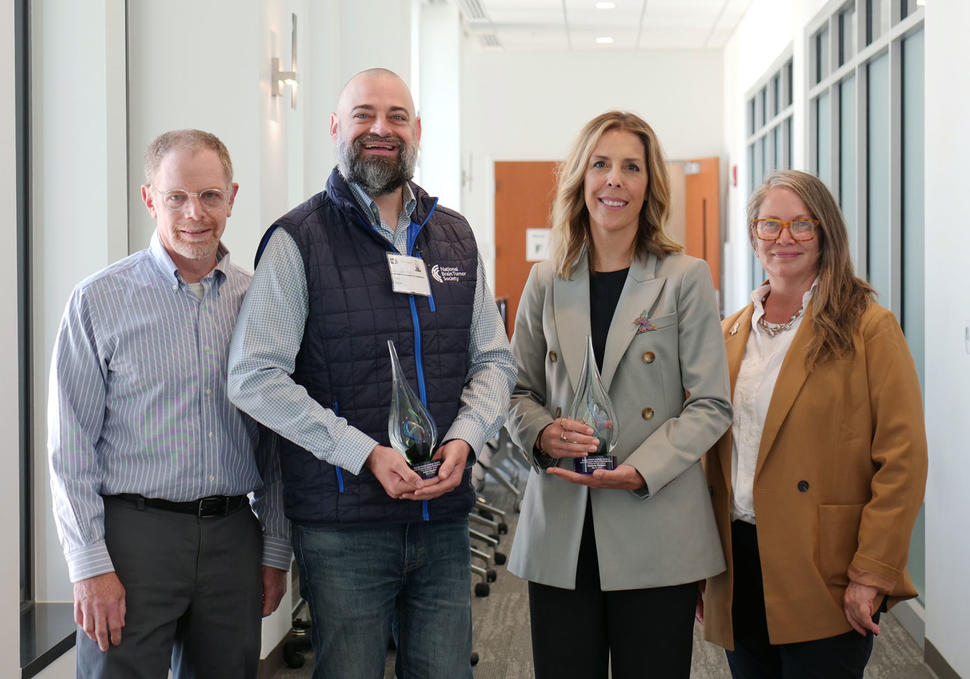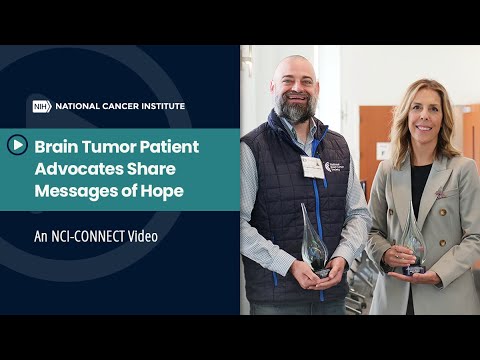Bringing the Patient, Caregiver, and Advocate Voice to Clinicians and Researchers to Better Understand Survivorship
, by Brittany Cordeiro, NCI-CONNECT Program Manager
Adam Hayden and Kimberly Wallgren visited NCI to share their invaluable perspectives on survivorship and person-centered care in neuro-oncology.
On May 5, the NCI Center for Cancer Research’s Neuro-Oncology Branch (NOB) held the inaugural Survivorship in Neuro-Oncology Visiting Scholar Lecture with two special guests: Adam Hayden and Kimberly Wallgren. The NOB’s Visiting Scholar Program is a lecture series that fosters collaboration and learning in neuro-oncology by inviting experts across a variety of specialties to network and give an educational lecture.
Hayden and Wallgren were hosted by Terri Armstrong, Ph.D., NOB deputy chief and a senior investigator who heads the Patient Outcomes Research Program. The program focuses on developing ways to accurately measure the impact of brain and spine tumors and treatments on patients—as well as how to lessen that impact.
“We have only recently started to question the meaning of person-centered care, and how treatment and care programs can be tailored to meet the individual needs of patients and caregivers,” Dr. Armstrong, who also co-leads NCI-CONNECT, shared in her opening remarks. “Person-centered care means treating patients as individuals and as partners. It's personalized, coordinated, and enabling. I think it's fitting that we asked Adam and Kim here today to share their perspectives.”
Hayden is a seven-year glioblastoma survivor and a nationally recognized advocate for people with brain tumors. He has published his perspective in academic presses, facilitates national support conversations, and has professional appointments, including membership on the National Brain Tumor Society (NBTS) Board of Directors. Hayden was also recently awarded the 2022 Jan Esenwein Public Service Award in Neuro-Oncology by the Society for Neuro Oncology.
Wallgren was a caregiver to her late father, Dallas Mathile, who survived a rare brain tumor diagnosis called an ependymoma for over 20 years. She is the executive director of the Collaborative Ependymoma Research Network (CERN) Foundation, a program of NBTS, which was started in 2006 upon her father's recurrence with ependymoma. The CERN Foundation supports education, awareness, and research for people diagnosed with ependymoma. Wallgren creates its research strategy, oversees its patient support strategy, produces educational content, and advocates for the ependymoma community within professional and nonprofit communities.
"Hearing Adam’s and Kim’s thoughts and getting their insights should energize those of us who care for patients with cancers of the central nervous system and their families, as well as those of us who spend our careers investigating ways to improve outcomes for these patients,” said Mark Gilbert, M.D., chief and senior investigator at the NOB and co-leader of NCI-CONNECT, as he welcomed the visiting scholars.
Understanding Quality of Life Decision-Making
The median survival for glioblastoma is 15 to 18 months. When Hayden was diagnosed in 2016, he learned that his glioblastoma had a certain mutation in the gene that encodes the isocitrate dehydrogenase (IDH) enzyme. For patients with this type of tumor, the median survival is closer to 31 months.
“If you tell a 34-year-old with three kids that he's going to have 31 months instead of 15 months, that feels much different to me. I get to plan my life a little bit differently,” Hayden shared. This gave Hayden more time to be a loving father and husband, make lasting memories with his family, and set big goals to advocate for the brain tumor community.
Hayden also continues to make important medical decisions based on advice from the neurosurgeon who removed his tumor one week after his diagnosis. As Hayden explained: “He said to me, ‘You have got to make a decision based on your quality of life today, not what could be the case in the future.’” Now, every time Hayden is confronted with a tough medical choice, he considers whether his decision will likely help or hurt his current quality of life. If it could worsen how he feels or functions today, the potential benefit of tomorrow isn’t worth the risk.
It's more important to know what sort of person has a disease than to know what sort of disease a person has.
When Wallgren stepped up to the podium, she shared that, in the 21 years after her father’s initial diagnosis, she couldn’t count how many times her father’s health was at a critical point.
“Our neuro-oncology teams were working outside of the scope of traditional medicine,” Wallgren said. Most neuro-oncology health care teams have little experience treating ependymoma due to its rarity. And, more so, most people with ependymoma do not survive as long as Wallgren’s father. “Our care team didn't always have the answers, and that was okay. But without their decision-making and willingness to collaborate—and most importantly their willingness to listen to us and to support us—we would've been in a much, much harder and lonelier place.”
Wallgren also shared that there's not a natural transition from a primary treating doctor to a long-term doctor that can partner with patients and care partners to deal with the impactful quality of life issues that plague their survivorship.
“We can celebrate not dying for the time being, but the nuances, the unknowns, the challenges, and the hardships presented in survivorship of a central nervous system disease can never be properly captured by the word 'survivorship,'” Wallgren said. “Survivorship was not an easy road for us to navigate.” Now, as a patient navigator, she provides helpful resources to patients, including important considerations, key questions, and referral options.
“Patients have lived experience that can be tapped into,” Hayden added. Clinicians and researchers should respect it, see the benefit in it for them and the patient, and then empower patients to share it.
Advising Clinicians, Researchers, and the Community
In their lectures, Hayden and Wallgren also shared how they think clinicians can improve the care and information they provide patients and their families—and their enthusiasm for research. Wallgren said that she follows the advice of a friend and mentor who taught her to always ask patients, "What do you want?"
“Perhaps this is one of the most important questions you can ask people despite their situation and despite what you might assume to be true,” Wallgren said. Her response to her father’s diagnosis was to dive in and act. “The action and the ‘doing’ kept me moving forward, but it didn't begin to tend to the wounds within.”
Wallgren has been a patient navigator for people with ependymoma for nearly 16 years and explained that sometimes people reach out and they don't even know what to ask or to say. “They just need another human being to connect and process the unknowns that they have,” she said. “You often don't need to have all the answers. Having an awareness of some of the challenges can be more than enough.”
Hayden shared that sometimes people forget that patients have a life outside of the exam room. “Everything in medicine works to standardize patients,” he said. He referenced author and endocrinologist Victor M. Montori, M.D., who asked the question in his book Why Patients Revolt, "Are we treating patients like this, or are we treating this patient?"
“Science looks at the patient as it should, but the diagnosis doesn't stop there. Even in my own life today, my father’s brain tumor diagnosis still has a hold on me,” Wallgren said. “I'm convinced that the ripple effect of a brain tumor diagnosis is one of the least understood—but most deeply vast and entrenching—consequences on a community.”
In recent years, Hayden and Wallgren have put all they have learned from their experiences into advocating for the brain tumor community. They also have hope in research, including the work they saw firsthand several hours before the Visiting Scholar Lecture when they visited the NOB’s labs.
“The work that these researchers are doing to better characterize the disease and understand the social determinants of health is really exciting, because it can have an immediate impact on improving quality of life,” Hayden said.

